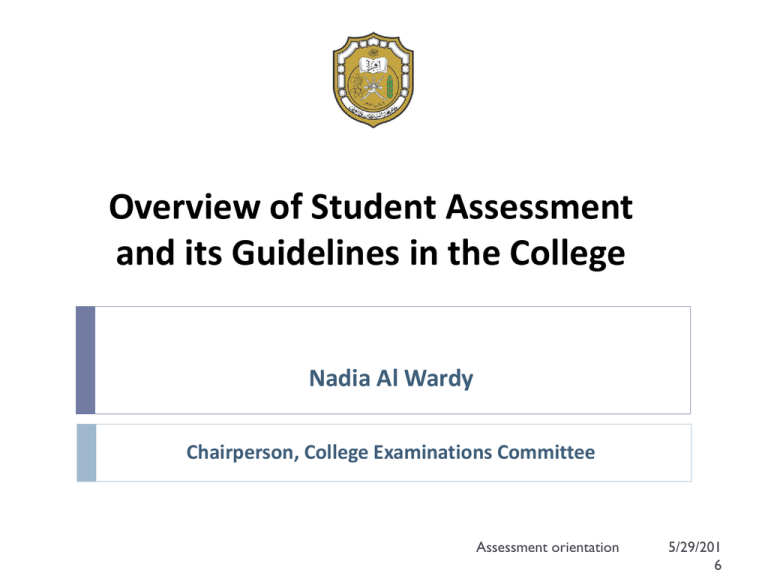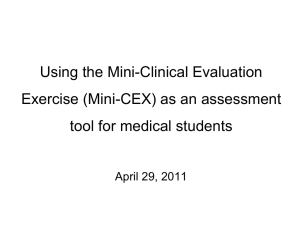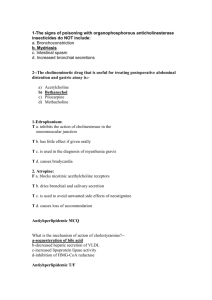Overview of Student Assessment and its Guidelines in the College
advertisement

Overview of Student Assessment and its Guidelines in the College Nadia Al Wardy Chairperson, College Examinations Committee Assessment orientation 5/29/201 6 Standards of “Sound Assessment” • Continuous assessment • Evidence of linkage to course objectives • Diversity of assessment methods • Assess different levels of achievement • Criterion referenced • Marking accurate and consistent • Feedback meaningful and helpful • Should enhance student learning • Students’ awareness of criteria • Proportional to the workload of the course http://www.squ.edu.om/Portals/6/docs/Docss/Assessment%20Policy%20Regulations%20&%20Guidelines-Oct%202009.pdf http://www.squ.edu.om/Portals/20/PDF/Acad%20Regulations/english%20regulation.pdf The assessment process Specifying the purpose Determining what is to be measured and how Measuring it Setting standards of expected performance Reporting results Making a judgement Specifying the Purpose Formative Diagnosis Summative Promotion Certification Determining what is to be measured and how Blueprinting A matrix of: What to assess? knowledge, skills, attitudes How to assess? Different assessment tools MCQ EMI MEQ SAQ OSPE/OSCE Mini-CEX CbD OLC …. Guidelines Vetting: For all exams, questions / stations / cases etc. should be reviewed and emended by the relevant committees before the examination takes place Relevance (Scenarios) Types (at least 2 different modalities) IDEAL Office International assessment bank Over 31000 questions available Formats of assessment in Phases I, II and III Domain/Outcome Phase I Clinical Skills Health Promotion & Disease Prevention Phase II Phase III OSCE Mini-CEX, CbD, OLC, OSCE, Seminars,WRP, BSP, SC, OSPE MCQ, Reports Seminars, OSCE, OLC, CbD Communication Skills TBL Present Seminars, OSCE, OLC, CbD, MCEX Medical Informatics CBA MCQ, CBA MCQ, CBW MCQ, Spotter Lab rep, SAQ MCQ, SAQ, CBP Quiz, problems, Spotter, EMI, OBE, OSPE, MEQ,Viva MCQ, EMI, MEQ, KFQ, SAQ Assignment, Project, Proposal,Thesis, SAQ MCQ, Mini-CEX, CbD, OLC TBL, OBE Assignment, Project Poster,Thesis,TBL, Present Portfolio Knows Knows How Basic, Social & Clinical Sciences Attitudes, Ethics & Legal Responsibility Personal & Professional Development Miller’s Pyramid Shows How Does Principles of assessment (Reliability) Sampling No. of assessments (min of 3 components) No. and quality of questions (at least 30 MCQs or equivalent/credit hour) No. and quality of examiners Weighting of components (no single component to exceed 60% of total marks) Time per question (1.5 - 2 min/MCQ) Example of assessment in courses of Phase I, II, and BMS Course/Module No. of No. of credits components Weighting Format Intro to Anatomy 4 4 20%, 20%, 20%, 40% MCQ, Spotter, online Locomotor system 3 3 30%,10%, 60% MCQ, OSPE Integrated Modules 3 3 30%, 20%, 50% MEQ, OSCE Molecular Diagnostics 3 3 20%, 20%, 60% MCQ, practical Assessment in Phase III Stage Block Continuous (50%) Final (50%) Stage I Pre-Clerkship 3 Mini-CEX MCQ and EMI Junior Clerkship: Med/CH & allied block Surg & allied block BM/Fam block Mini-CEX, OLC, KFQs (40%) Portfolio (seminars, ward round presentations, bedside procedures, case write-ups) (10%) 80 MCQ & EMI, 20 SAQ (30%) Senior Clerkship: Med/Famco & allied block, Surg & allied block, Women & Child block Mini-CEX, OLC, (CbD), KFQs (40%) 60 MCQ & EMI, Seminars,Ward round presentations, 20 SAQ (30%) Bedside Procedures, Case write-ups (10%) 4 OSCE (20%) Stage II 8 OSCE (20%) Elective Selective Pre-Internship FMD 120 MCQ (20%) 120 SAQ (20%) 15 OSCE (20%) 8 Short Cases (40%) Pre-clerkship (10 weeks) Ophthalmology (3) Junior Clerkship (48 weeks) Stage 1 Behavioral Medicine, Communication Skills, History Taking, Physical Examination Skills, Ethics, Prescribing, Medical Records, HIS Surgery (6) Child Health (6) Orthopedics, Rehab and Pain Management (4) Medicine (7) SLT (Lab) (1) Clinical Genetics & Counseling (2) MED/CH FAMCO (5) Behavioral Medicine (7) Dermatology(2) SLT (Anes) (1) SLT (Stats) (1) SLT (Geriatrics) (1) SLT Forensic Medicine (1) Study Break (1 week) SURG Oral Health (1) BM/Fam Junior Clerkship Exams (1 week) Child Health (3) Surgery (3) 3 block exams A&E (4) ICU (1) Obs/Gyne (8) Medicine (7) SLT (Therap) FAMCO (3) SLT (Lab) (2) Elective (8) ENT (2) Hematology (2) Radiology (2) Selective (2) (1) MED/Fam Study Break (1 week) SURG Senior Clerkship Exams (1 week) Women & Child Buffer (3 weeks) Pre-Internship (12 weeks) Stage 2 Senior Clerkship (48 weeks) Buffer (3 weeks) Pre-Internship Medicine (3 weeks) Surgery (3 weeks) Child Health (3 weeks) Study Break (2 weeks) FINAL MD EXAM (2 weeks) Obs/Gyn (3 weeks) 3 block exams Junior Clerkship Week A B C D E F 1 Med x CH x Surgery x Ophthal x BM x FAMCO x 2 Med x CH x Surgery x Ophthal x BM x FAMCO x 3 Med x CH x Surgery x Ophthal Mini-CEX BM x FAMCO Mini-CEX 4 Med OLC CH Mini-CEX Surgery Mini-CEX Orthopedics x BM Mini-CEX FAMCO Mini-CEX 5 Med Mini-CEX CH Mini-CEX Surgery Mini-CEX Orthopedics x BM x FAMCO OLC 6 Med Mini-CEX CH OLC Surgery OLC Orthopedics Mini-CEX BM Mini-CEX Dermatol x 7 Med OLC Genetics x Anesthesia Mini CEX Orthopedics Mini-CEX BM SAQ Dermatol KFQ 8 Lab SAQ Genetics SAQ EBM MEQ Forensic MCQ Geriatric SAQ Oral Health KFQ Marking MCQ and EMI: MEQ, SAQ and Essays: if not done on-line, then optical marking. model answers double marking is encouraged OSCE/OSPE, Mini-CEX, OLC, Presentations, Reports… checklists and rating scales several examiners should be available, but one examiner should mark the same question for all students for consistency. Standard Setting Standard setting method Angoff Hofstee Borderline group Fixed percentages (eg 60%) Grade descriptions Grade Description A Exceptional performance; all course objectives achieved; objectives met in a consistently outstanding manner. B Very good performance; significantly more than the majority of the course objectives achieved (majority being at least two-thirds); objectives met in a consistently thorough manner. C Satisfactory performance: at least the majority of course objectives achieved; objectives met satisfactorily. D Minimally acceptable performance: less than the majority but more than the minimum required course objectives achieved; objectives met at a minimally acceptable level. F Unacceptable performance: minimum required course objectives not met; objectives not met at a minimally acceptable level; no credit earned. FW Failure to meet the attendance requirement, no credits earned FSP Failure with Supplemental Privilege Programme for conversion of scores to grades Item analysis and test statistics IDEAL Office Determination of difficulty, discrimination and reliability indices Results of these analyses should be discussed by the relevant committees to assist in making informed decisions Reporting results What? Grade sheets filled online to be submitted to the Examination Office before and after confirmation of grades (timeline) Separate spreadsheet showing scores of all ICAs and final accompanied by course report form Grade report form To whom? Examinations Committee through Examinations Office Feedback ICAs: within 1 week timetabled should not involve release of questions but a discussion of points of weaknesses Finals not discussed Management College Board College Examinations Committee Phase II Exam Subcommittee Written group Phase III Exam Subcommittee OSCE group IP and BMS Exam Subcommittee SC group Management College Board College Examinations Committee • Chairman • ChairmanPhase (CC) III Exam Phase II Exam IP and BMS Exam Subcommittee Subcommittee Subcommittee • Assistant Deans (Pre-clinical and Clinical) • Phase Coordinators • Senior staff members Written group OSCE group • Examinations Officer SC group Management College Board College Examinations Committee Phase II Exam Subcommittee • Course/module coordinators Written group Phase III Exam Subcommittee IP and BMS Exam Subcommittee • PC, JC and SC Block coordinators • Chairs/Reps Dept Exam Committees OSCE group SC group Examinations Office • • • • • • • • • • Examination timetables Examination booklets, optical mark sheets, etc Administrative forms related to examinations Copy, store (electronically), and ensure security of all examination question papers Assignment of invigilators Prepare, print, and distribute information relating to assessments Coordinating the visit of External Examiners Collection of grades Liaising with A&R in matters related to assessment …..




